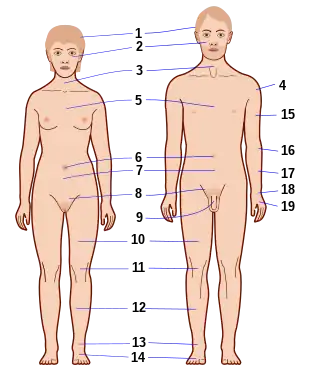hode
English
Etymology
From Middle English hoden, hodien, from Old English hādian (“to ordain, consecrate”), from Old English hād (“rank, order, office, holy office”). More at hade (“state, order, rank”).
Pronunciation
- (Received Pronunciation, UK) IPA(key): /həʊd/
Audio (Southern England) (file) - (General American, US) IPA(key): /hoʊd/
- Rhymes: -əʊd
Verb
hode (third-person singular simple present hodes, present participle hoding, simple past and past participle hoded)
- (transitive, obsolete) To ordain; consecrate; admit to a religious order.
Danish
Noun
hode n (singular definite hodet, plural indefinite hoder)
- Pronunciation spelling of hoved (“head”).
Descendants
- Norwegian Bokmål: hode
Dutch
Etymology 1
Borrowed from Papiamentu hode.
Pronunciation
- IPA(key): /ɦɔˈdɛ/
- Hyphenation: ho‧de
Interjection
hode
- (Netherlands, slang) Used to convey surprise: holy shit; bloody hell
- 2018, “In A Way”, performed by BKO:
- Zeg hem jij komt niet bij mij, no way // To-toch geef ik ze een kans, hode.
- Tell him you're not coming to me, no way // St-still I'mma give her a chance, holy shit.
- 2019, “Hode”, performed by Jintra:
- Ben ik een gangster, dan zeg ik: Hode // Ben jij een rapper, dan zeg je: Hode
- Am I a gangster, then I'll say: Hot damn // Are you a rapper, then you'll say: Hot damn
- 2019, “Van Vliet”, performed by Dv:
- Wordt kanker heet van die boetes // Die bitch moet pijpen niet smoelen (Hode)
- It's getting hot as fuck from all those fines // That bitch should suck not blabber (Damn)
Etymology 2
From Middle Dutch hōde, from Old Dutch *hotho, from Proto-West Germanic [Term?], from Proto-Germanic *huþô.
Pronunciation
- IPA(key): /ˈɦoːdə/
- Hyphenation: ho‧de
Indonesian
Etymology
From a monster name in Ragnarok Online which have similar appearance to a penis. Popularized in online game Ayodance. Probably related to German Hode (“testicle”) and its ancestor Proto-Indo-European *(s)kewH- (“to cover, hide”).
Pronunciation
- IPA(key): [ho.dɛ]
- Hyphenation: ho‧de
Middle Dutch
Etymology
From Old Dutch *hotho, from Proto-West Germanic *hoþō, from Proto-Germanic *huþô.
Noun
hōde f
- testicle
- ca. 1475, Reinaerts historie, page 325, lines 7336–7337:
- ende grepen, recht als was sijn meen, // al vast bi beide sijn hoden,
- and he grabbed, as it was his common right, // tight at both his testicles,
References
- Verwijs, E., Verdam, J. (1885–1929) “hode”, in Middelnederlandsch Woordenboek, The Hague: Martinus Nijhoff, →ISBN
Middle English
Etymology 1
From hood (noun).
Etymology 2
From Old English hōd.
Etymology 3
From Old English hād.
Norwegian Bokmål
| Picture dictionary | ||
|---|---|---|
| ||
|
Etymology
From Danish hoved, from Old Danish houæth, from Old Norse hǫfuð, from Proto-Germanic *hafudą, *habudą, northern form of *haubudą, from Proto-Indo-European *kauput-, *kaput- (“head”). Cognate with Norwegian Nynorsk hovud, Swedish huvud, Icelandic höfuð, English head, Dutch hoofd, German Haupt.
The form hode goes back to a pronunciation in 19th-century Copenhagen Danish. Compare the contemporary standard [ˈhoːð̩], which could also stand for *hode.
Pronunciation
- IPA(key): /ˈhuːdə/
References
- “hode” in The Bokmål Dictionary.
Norwegian Nynorsk
Etymology
From Norwegian Bokmål hode, from the Copenhagen pronunciation of Danish hoved. Partially replaced South East Norwegian dialectal hue (< huvu, hugu) in recent years.
Noun
hode n (definite singular hodet, indefinite plural hode, definite plural hoda)
- (rare and nonstandard) alternative form of hovud (“head”)
- 1975, Edvard Hoem, Anna Lena, Oslo: Samlaget, page 13:
- Ein hyssingfloke er limt på hodet hans til hår
- A tangle of string is glued to his head as hair

